VOL. I. AUGUST, 1924

No. 5
Entered at the Post Office at University of Richmond, Va., as Second-Class Mail Matter

VOL. I. AUGUST, 1924

No. 5
Entered at the Post Office at University of Richmond, Va., as Second-Class Mail Matter
Announcement of The Morning and Evening Schools of Business Administration 1924-1925
SESSION OPENS SEPTEMBER 17, 1924
Morning School in Richmond College Buildings
Stop 30, Westhampton Car Line
Evening School in Buildings of T. C. Williams Law School
Lombardy and Grace Streets
For Information Address
PROFESSOR R. B. HARRIS
UNIVERSITY of R1CHilOND

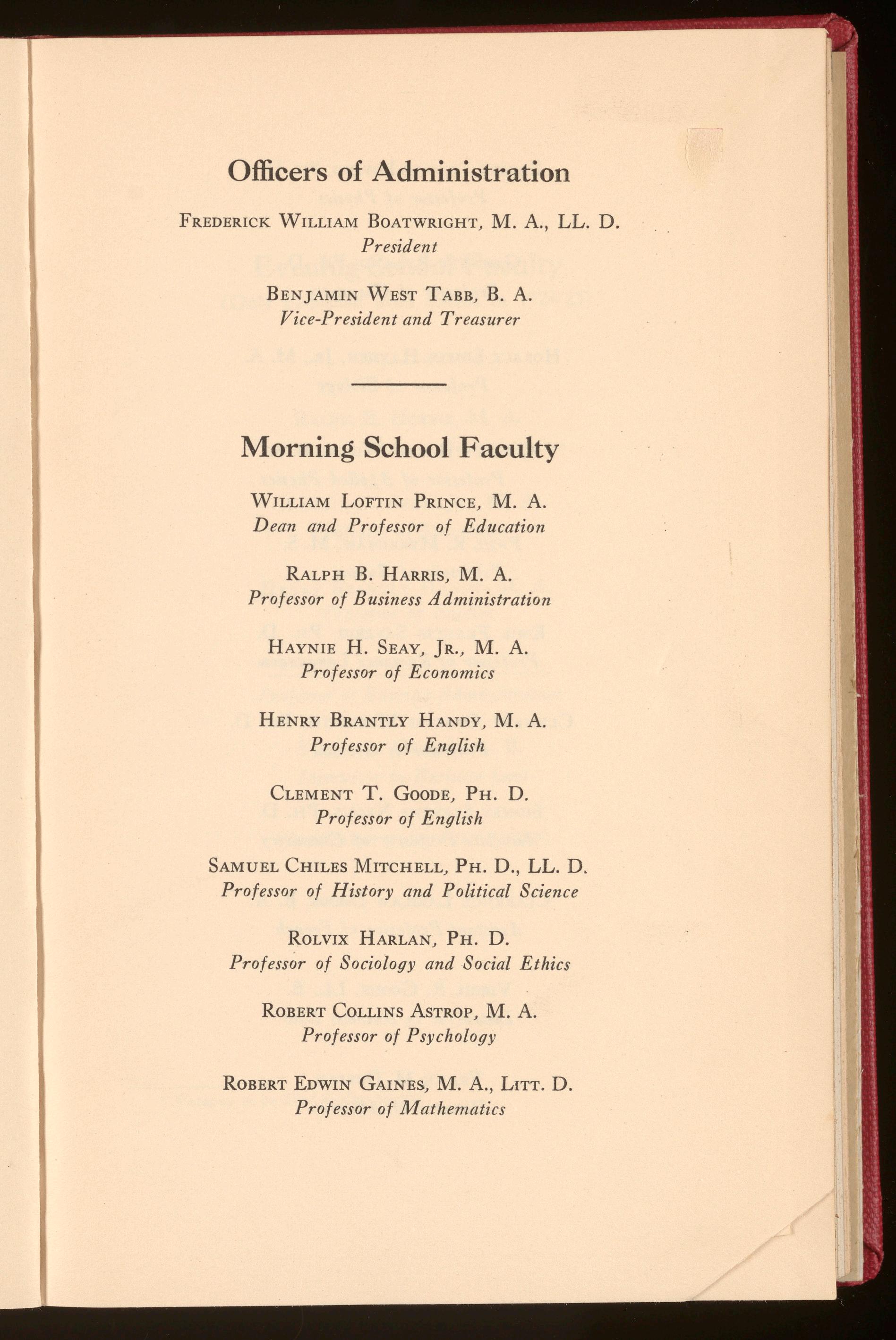
FREDERICK WILLIAM BOATWRIGHT, M. A., LL. D. President
BENJAMIN WEST TABB, B. A. Vice-President and Treasurer
WILLIAM LOFTIN PRINCE, M. A. Dean and Professor of Education
RALPH B. HARRIS, M. A. Professor of Business Administration
HAYNIE H. SEAY, JR., M. A. Professor of Economics
HENRY BRANTLY HANDY, M. A. Professor of English
CLEMENT T. GOODE, PH. D. Professor of English
SAMUEL CHILES MITCHELL, PH. D., LL. D. Professor of History and Political Science
RoLVIX HARLAN, PH. D. Professor of Sociology and Social Ethics
ROBERT COLLINS AsTROP, M. A. Professor of Psychology
ROBERT EDWIN GAINES, M. A., LITT. D. Professor of Mathematics
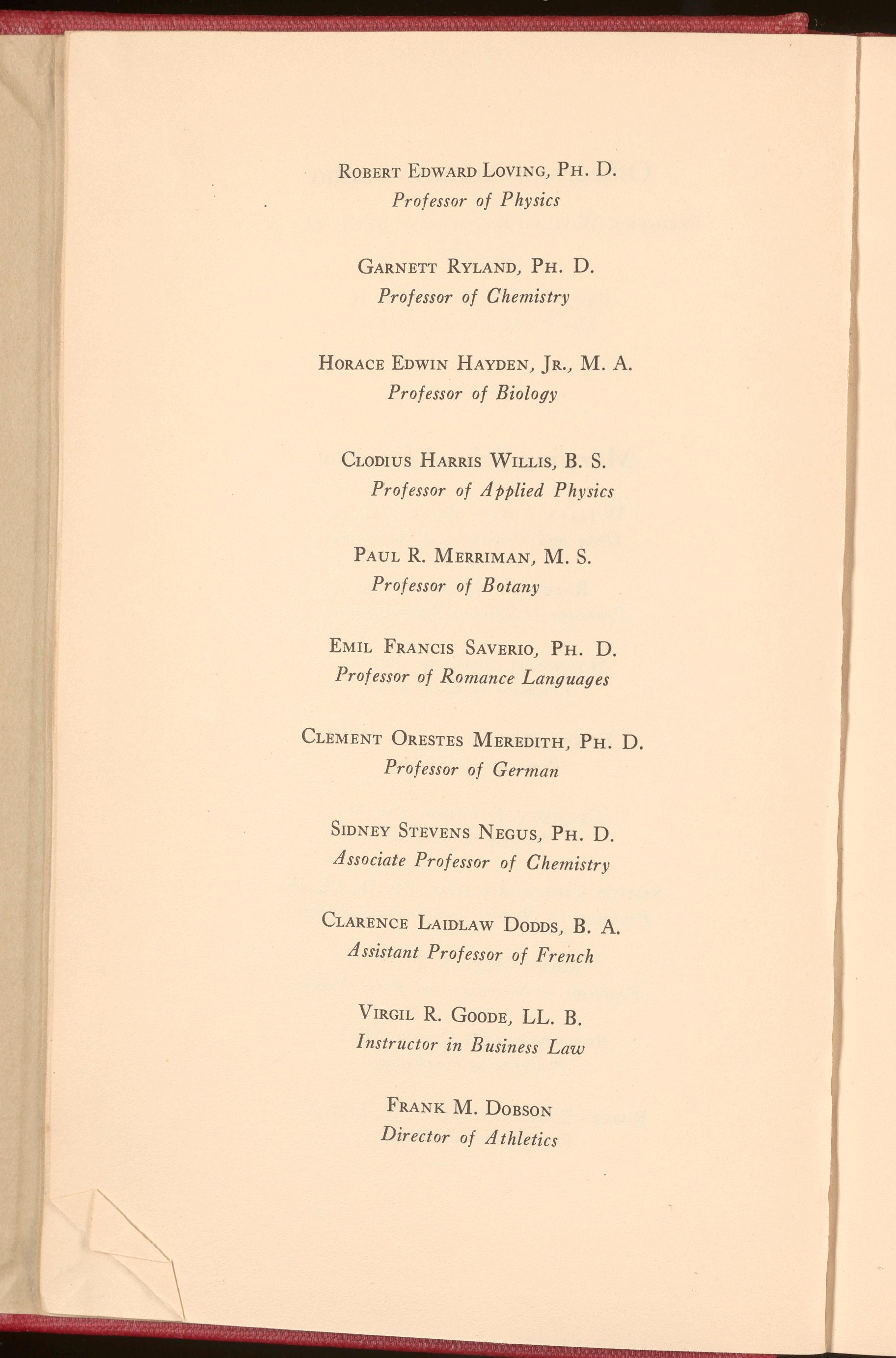
ROBERT EDWARD LOVING, PH. D. Professor of Physics
GARNETT RYLAND, PH. D. Professor of Chemistry
HORACE EDWIN HAYDEN, JR., M.A. Professor of Biology
CLODIUS HARRIS WILLIS, B. s. Professor of Applied Physics
PAUL R. MERRIMAN, M. s. Professor of Botany
EMIL FRANCIS SAVERIO, PH. D. Professor of Romance Languages
CLEMENT ORESTES MEREDITH, PH. D. Professor of German
SIDNEY STEVENS NEGUS , PH. D. Associate Professor of Chemistry
CLARENCE LAIDLAW DODDS , B. A. Assistant Professor of French
VIRGIL R. GOODE, LL. B. Instructor in Business Law
FRANK M. DOBSON Director of Athletics
( Only Freshman work offered in 1924-25)

RALPH B. HARRIS, M. A. Professor of Business Administration
HAYNIE H. SEAY, JR., M. A. Professor of Economics
HENRY BRANTLY HANDY, M.A. Professor of English * Professor of Business Administration
VIRGIL R. GOODE, LL. B. Instructor in Business Law
(LECTURERS TO BE ANNOUNCED)
* Vacancy to be filled during August.


The twentieth century has witnessed the organization m many American universities of strong departments of business administration, and the number of students in such departments shows steady increase. To a growing extent the fields of banking, transportation, insurance, and industrial management demand highly trained men and women in positions of responsibility, and are asking the universities to meet their requirements. This new and insistent demand for college trained men and women in business is strengthened by the success of schools of law , medicine, and engineering in giving the specialized training of the school as contrasted with the haphazard training of the apprentice.
The University of Richmond established a department of Business Administration in 1919 . The classes have been taught in morning hours as part of the work offered in Richmond College. These courses will be continued in 1924-25, and in addition there will be opened in the new building of the T. C. Williams School of Law on West Grace Street an Evening School of Business Administration with classes from 6 :45 to 9 :45 P. M. Completion of entrance and degree requirements in either School will lead to the University degree of B. S. in Business Administration.
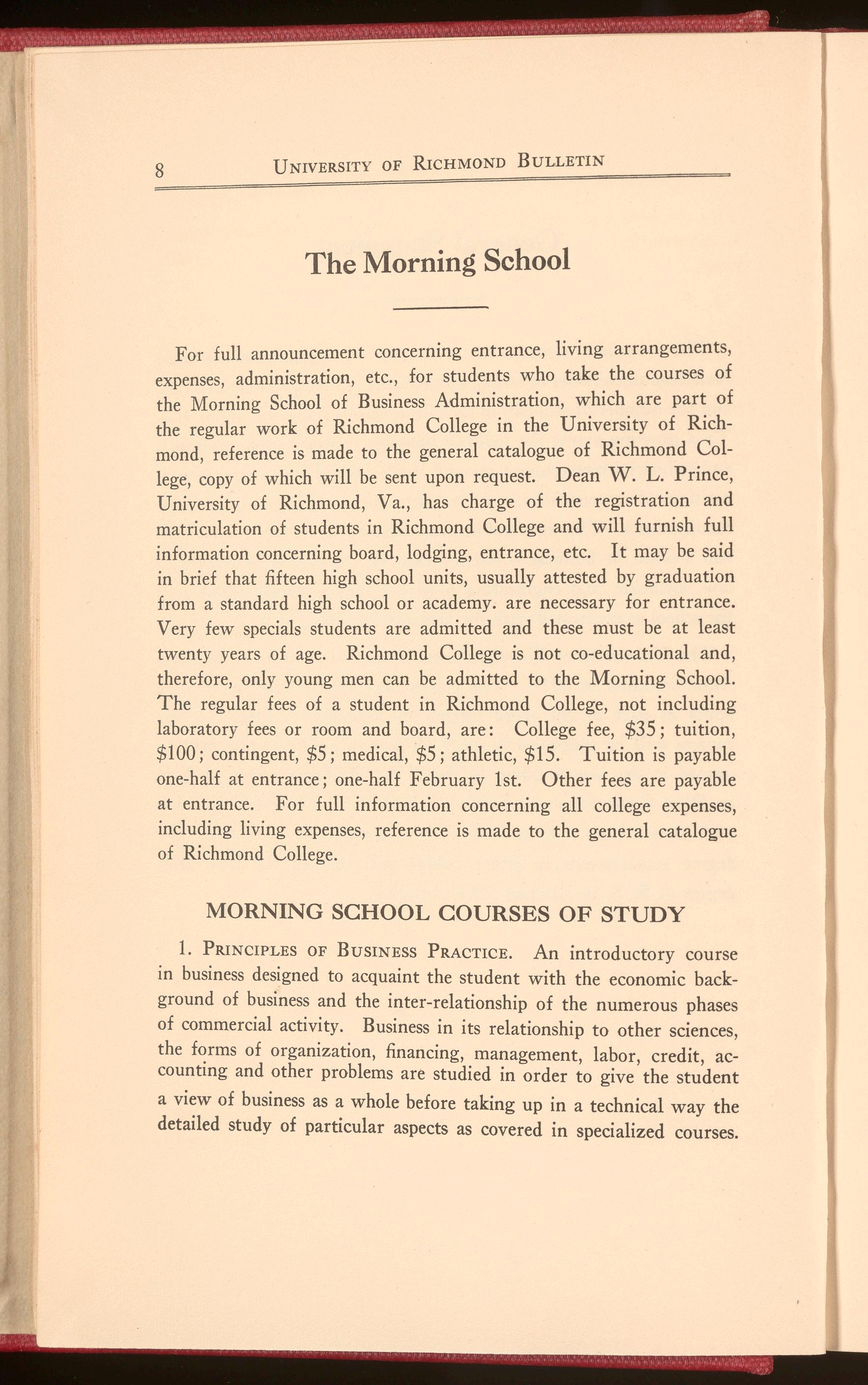
For full announcement concerning entrance, living arrangements, expenses, administration, etc., for students who take the courses of the Morning School of Business Administration, which are part of the regular work of Richmond College in the University of Richmond, reference is made to the general catalogue of Richmond College, copy of which will be sent upon request. Dean W. L. Prince, University of Richmond, Va., has charge of the registration and matriculation of students in Richmond College and will furnish full information concerning board, lodging, entrance, etc. It may be said in brief that fifteen high school units, usually attested by graduation from a standard high school or academy. are necessary for entrance. Very few specials students are admitted and these must be at least twenty years of age. Richmond College is not co-educational and, therefore, only young men can be admitted to the Morning School. The regular fees of a student in Richmond College, not including laboratory fees or room and board, are: College fee, $35; tuition, $100; contingent, $5; medical, $5; athletic, $15. Tuition is payable one-half at entrance; one-half February 1st. Other fees are payable at entrance. For full information concerning all college expenses, including living expenses, reference is made to the general catalogue of Richmond College.
1. PRINCIPLESOF BUSINESSPRACTICE. An introductory course in business designed to acquaint the student with the economic background of business and the inter-relationship of the numerous phases of commercial activity. Business in its relationship to other sciences, the f~rms of organization, financing, management, labor, credit, accounting and other problems are studied in order to give the student a view of business as a whole before taking up in a technical way the detailed study of particular aspects as covered in specialized courses.
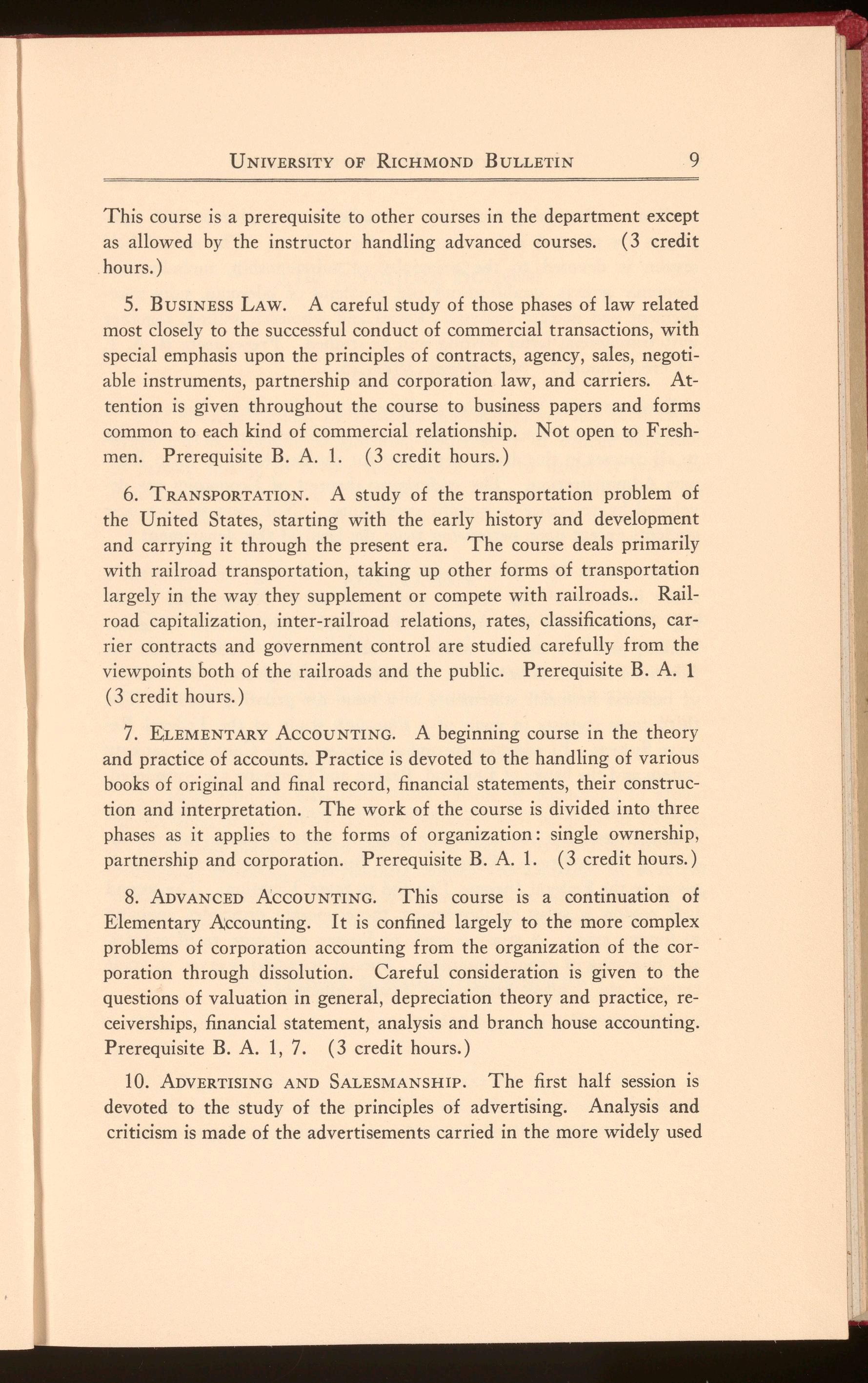
This course is a prerequisite to other courses in the department except as allowed by the instructor handling advanced courses. ( 3 credit hours.)
5. BUSINESSLAW. A careful study of those phases of law related most closely to the successful conduct of commercial transactions, with special emphasis upon the principles of contracts, agency, sales, negotiable instruments, partnership and corporation law, and carriers. Attention is given throughout the course to business papers and forms common to each kind of commercial relationship. Not open to Freshmen. Prerequisite B. A. 1. (3 credit hours.)
6. TRANSPORTATION. A study of the transportation problem of the United States, starting with the early history and development and carrying it through the present era. The course deals primarily with railroad transportation, taking up other forms of transportation largely in the way they supplement or compete with railroads.. Railroad capitalization, inter-railroad relations, rates, classifications, carrier contracts and government control are studied carefully from the viewpoints both of the railroads and the public. Prerequisite B. A. 1 ( 3 credit hours.)
7. ELEMENTARYACCOUNTING. A beginning course in the theory and practice of accounts. Practice is devoted to the handling of various books of original and final record, financial statements, their construction and interpretation. The work of the course is divided into three phases as it applies to the forms of organization: single ownership, partnership and corporation. Prerequisite B. A. 1. ( 3 credit hours.)
8. ADVANCEDAccoUNTING. This course is a continuation of Elementary A:ccounting. It is confined largely to the more complex problems of corporation accounting from the organization of the corporation through dissolution. Careful consideration is given to the questions of valuation in general, depreciation theory and practice, receiverships, financial statement, analysis and branch house accounting. Prerequisite B. A. 1, 7. (3 credit hours.)
10. ADVERTISINGAND SALESMANSHIP. The first half session is devoted to the study of the principles of advertising. Analysis and criticism is made of the advertisements carried in the more widely used
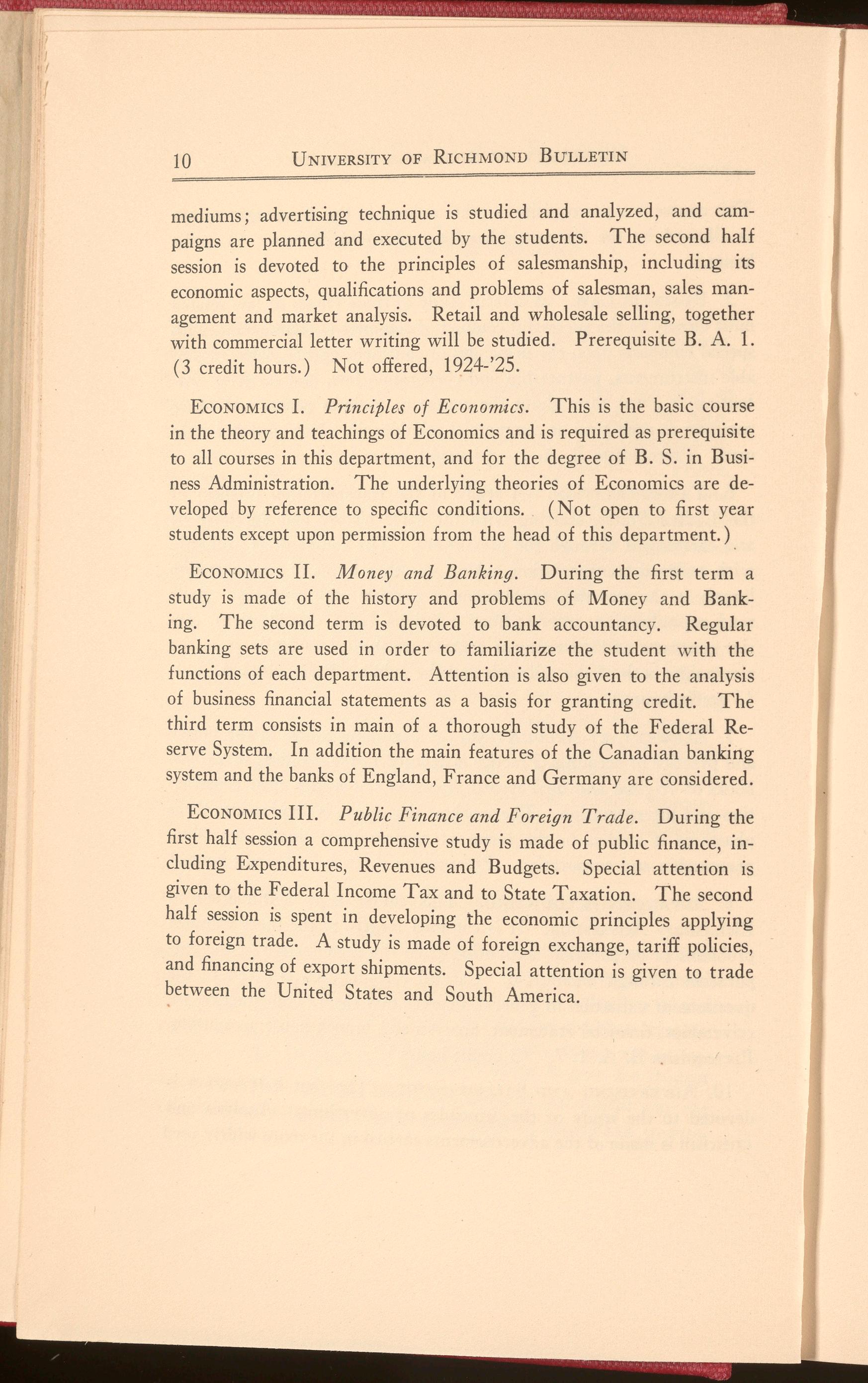
mediums; advertising technique is studied and analyzed, and campaigns are planned and executed by the students. The second half session is devoted to the principles of salesmanship, including its economic aspects, qualifications and problems of salesman, sales management and market analysis. Retail and wholesale selling, together with commercial letter writing will be studied. Prerequisite B. A. 1. (3 credit hours.) Not offered, 1924-'25.
ECONOMICSI. Principles of Economics. This is the basic course in the theory and teachings of Economics and is required as prerequisite to all courses in this department, and for the degree of B. S. in Business Administration. The underlying theories of Economics are developed by reference to specific conditions. (Not open to first year students except upon permission from the head of this department.)
ECONOMICSII. Money and Banking. During the first term a study is made of the history and problems of Money and Banking. The second term is devoted to bank accountancy. Regular banking sets are used in order to familiarize the student with the functions of each department. Attention is also given to the analysis of business financial statements as a basis for granting credit. The third term consists in main of a thorough study of the Federal Reserve System. In addition the main features of the Canadian banking system and the banks of England, France and Germany are considered.
ECONOMICSIII. Public Finance and Foreign Trade. During the first half session a comprehensive study is made of public finance, including Expenditures, Revenues and Budgets. Special attention is given to the Federal Income Tax and to State Taxation. The second half session is spent in developing the economic principles applying to foreign trade. A study is made of foreign exchange, tariff policies, and financing of export shipments. Special attention is given to trade between the United States and South America.
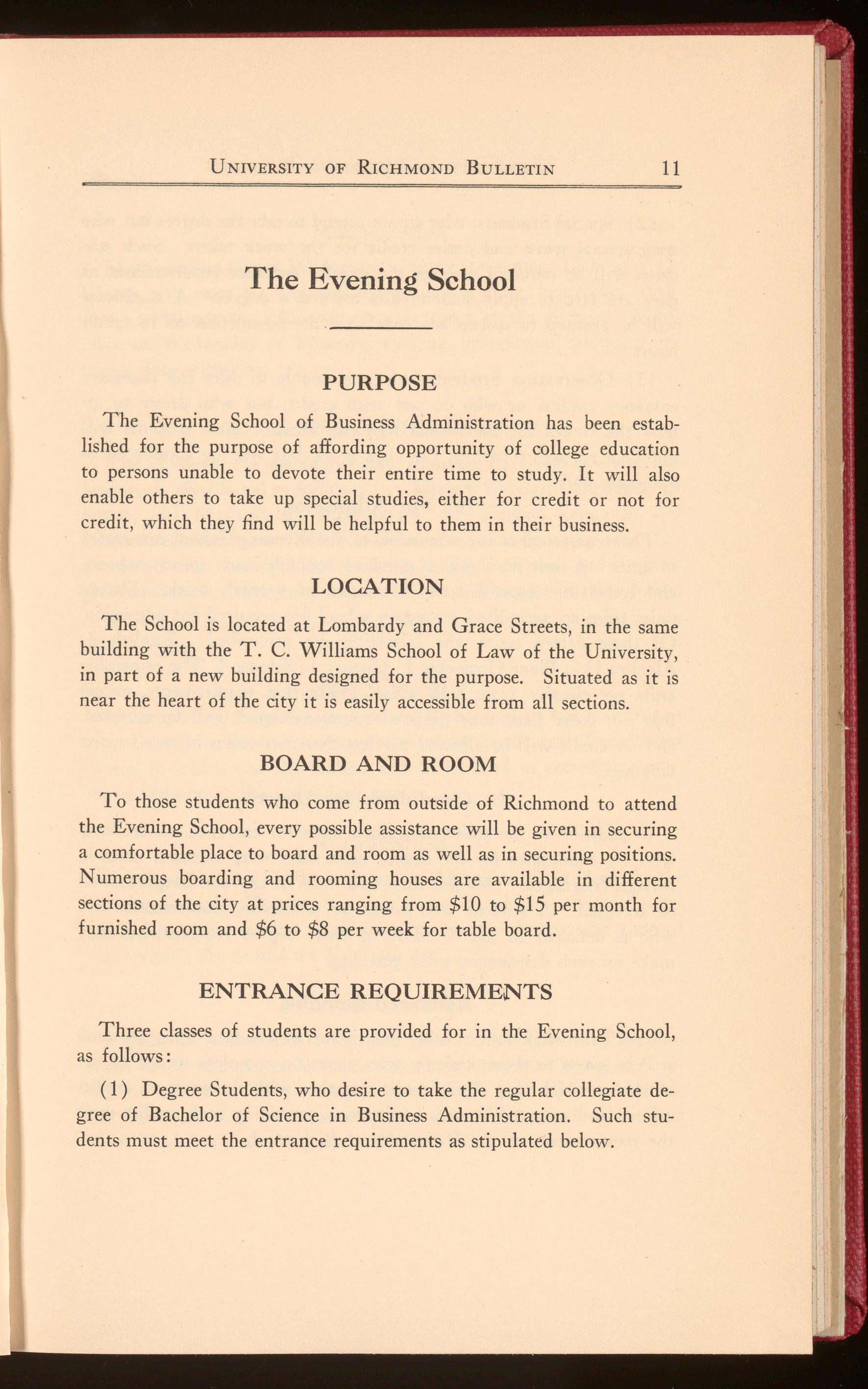
The Evening School of Business Administration has been established for the purpose of affording opportunity of college education to persons unable to devote their entire time to study. It will also enable others to take up special studies, either for credit or not for credit, which they find will be helpful to them in their business.
The School is located at Lombardy and Grace Streets , in the same building with the T. C. Williams School of Law of the University, in part of a new building designed for the purpose. Situated as it is near the heart of the city it is easily accessible from all sections.
To those students who come from outside of Richmond to attend the Evening School, every possible assistance will be given in securing a comfortable place to board and room as well as in securing positions. Numerous boarding and rooming houses are available in different sections of the city at prices ranging from $10 to $15 per month for furnished room and $6 to $8 per week for table board.
Three classes of students are provided for in the Evening School, as follows:
( 1) Degree Students, who desire to take the regular collegiate degree of Bachelor of Science in Business Administration. Such students must meet the entrance requirements as stipulated below.
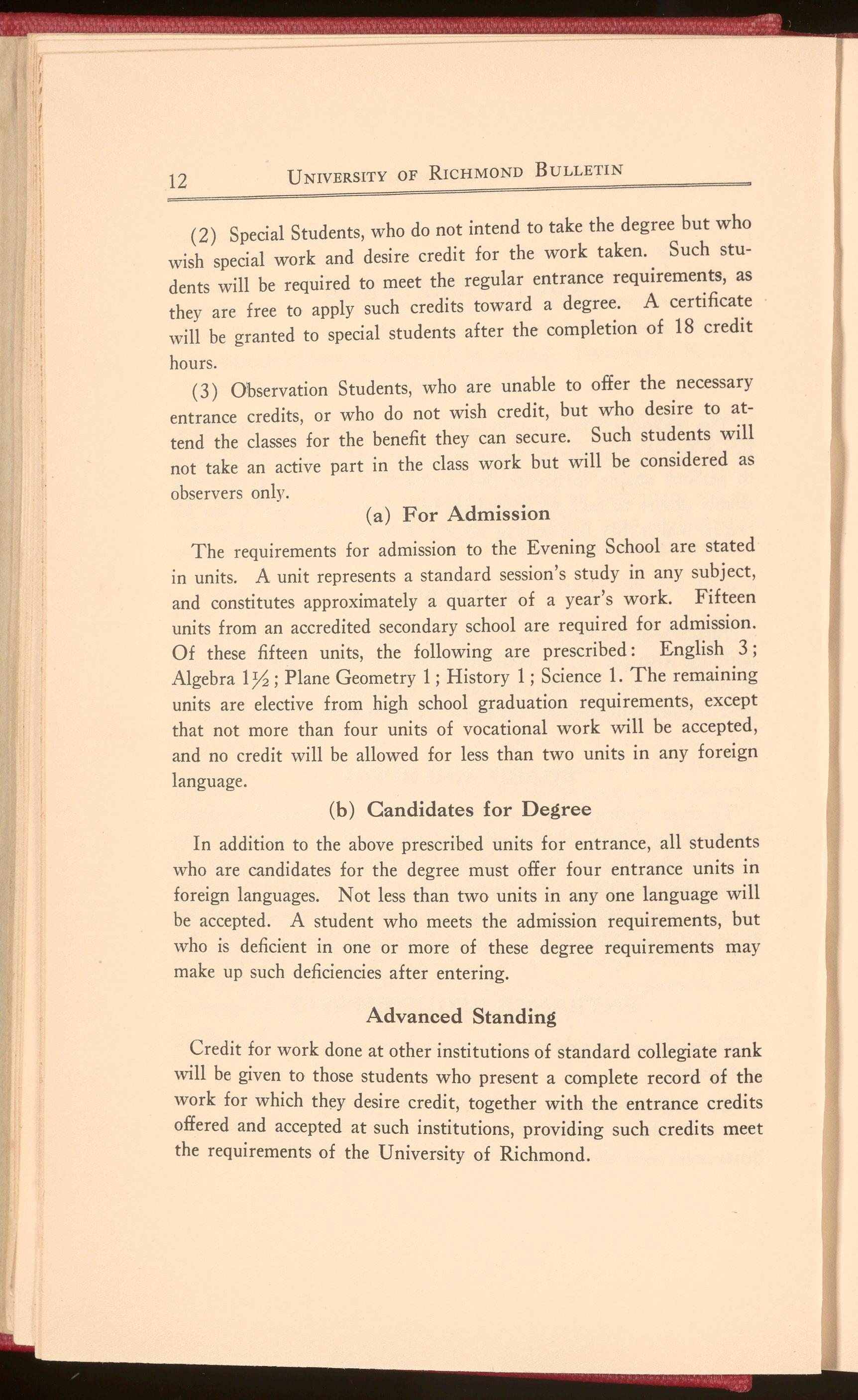
(2) Special Students, who do not intend to take the degree but who wish special work and desire credit for the work taken. Such students will be required to meet the regular entrance requirements, as they are free to apply such credits toward a degree. A certificate will be granted to special students after the completion of 18 credit hours.
( 3) Observation Students, who are unable to offer the necessary entrance credits, or who do not wish credit, but who desire to attend the classes for the benefit they can secure. Such students will not take an active part in the class work but will be considered as observers only.
The requirements for admission to the Evening School are stated in units. A unit represents a standard session's study in any subject, and constitutes approximately a quarter of a year's work. Fifteen units from an accredited secondary school are required for admission. Of these fifteen units, the following are prescribed: English 3; Algebra 1¼ ; Plane Geometry 1 ; History 1 ; Science 1. The remaining units are elective from high school graduation requirements, except that not more than four units of vocational work will be accepted, and no credit will be allowed for less than two units in any foreign language.
In addition to the above prescribed units for entrance, all students who are candidates for the degree must offer four entrance units in foreign languages. Not less than two units in any one language will be accepted. A student who meets the admission requirements, but who is deficient in one or more of these degree requirements may make up such deficiencies after entering.
Credit for work done at other institutions of standard collegiate rank will be given to those students who present a complete record of the work for which they desire credit, together with the entrance credits offered and accepted at such institutions, providing such credits meet the requirements of the University of Richmond.
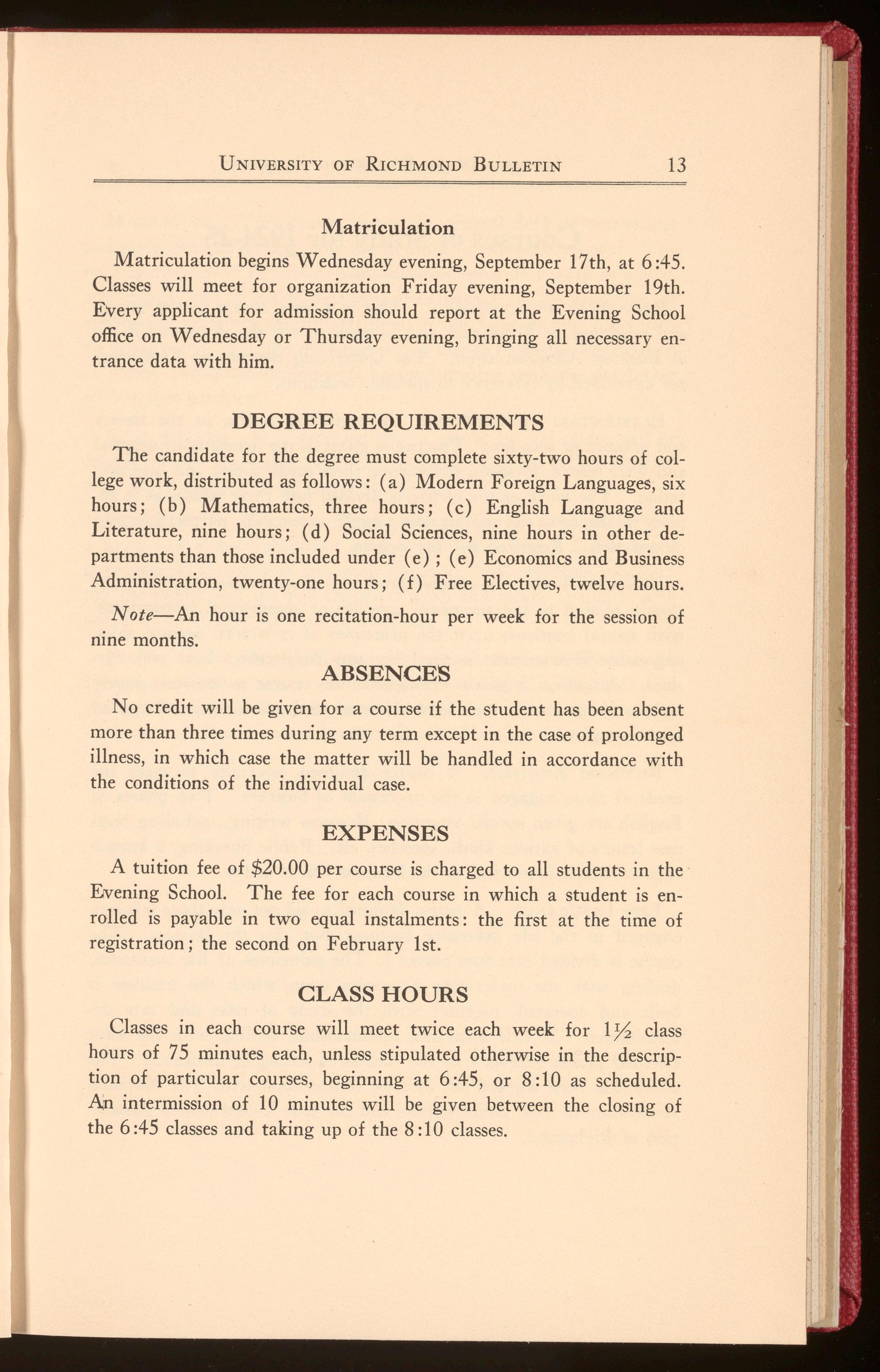
Matriculation begins Wednesday evening, September 17th, at 6 :45. Classes will meet for organization Friday evening, September 19th. Every applicant for admission should report at the Evening School office on Wednesday or Thursday evening, bringing all necessary entrance data with him.
The candidate for the degree must complete sixty-two hours of college work, distributed as follows: (a) Modern Foreign Languages, six hours; ( b) Mathematics, three hours ; ( c) English Language and Literature, nine hours; ( d) Social Sciences, nine hours in other departments than those included under ( e) ; ( e) Economics and Business Administration, twenty-one hours; (f) Free Electives, twelve hours.
Note-An hour is one recitation-hour per week for the session of nine months.
No credit will be given for a course if the student has been absent more than three times during any term except in the case of prolonged illness, in which case the matter will be handled in accordance with the conditions of the individual case.
A tuition fee of $20.00 per course is charged to all students in the Eivening School. The fee for each course in which a student is enrolled is payable in two equal instalments: the first at the time of registration; the second on February 1st.
Classes in each course will meet twice each week for 1¼ class hours of 75 minutes each, unless stipulated otherwise in the description of particular courses, beginning at 6 :45, or 8: 10 as scheduled. An intermission of 10 minutes will be given between the closing of the 6 :45 classes and taking up of the 8: 10 classes.
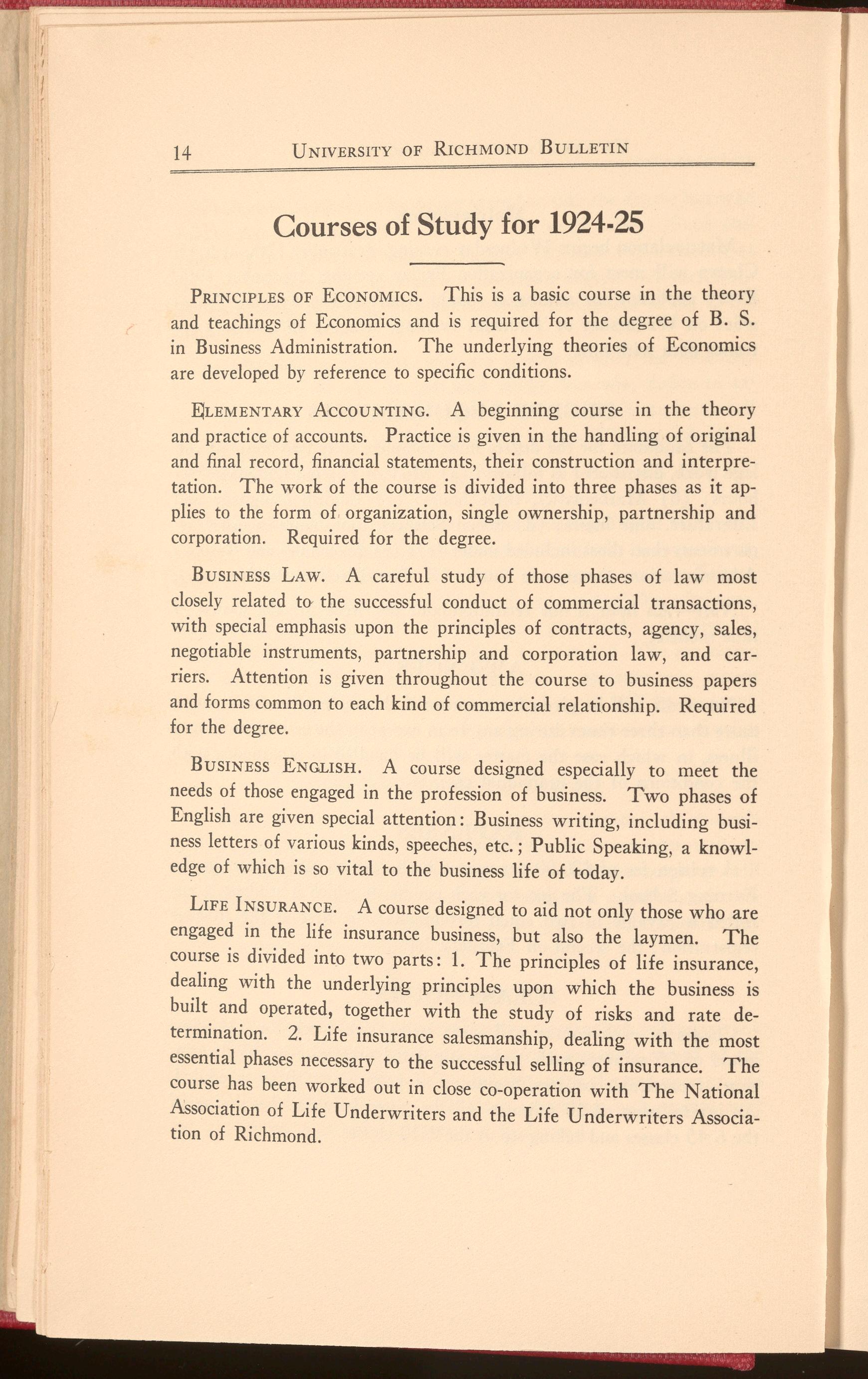
PRINCIPLESOF EcoNOMICS. This is a basic course in the theory and teachings of Economics and is required for the degree of B. S. in Business Administration. The underlying theories of Economics are developed by reference to specific conditions.
mLEMENTARYACCOUNTING. A beginning course in the theory and practice of accounts. Practice is given in the handling of original and final record, financial statements, their construction and interpretation. The work of the course is divided into three phases as it ap- plies to the form of organization, single ownership, partnership and corporation. Required for the degree.
BUSINESSLAW. A careful study of those phases of law most closely related to- the successful conduct of commercial transactions, with special emphasis upon the principles of contracts, agency, sales, negotiable instruments, partnership and corporation law, and car- riers. Attention is given throughout the course to business papers and forms common to each kind of commercial relationship. Required for the degree.
BUSINESS ENGLISH. A course designed especially to meet the needs of those engaged in the profession of business. Two phases of English are given special attention: Business writing, including busi- ness letters of various kinds, speeches, etc. ; Public Speaking, a knowl- edge of which is so vital to the business life of today.
LIFE INSURANCE. A course designed to aid not only those who are engaged in the life insurance business, but also the laymen. The course is divided into two parts: 1. The principles of life insurance, dealing with the underlying principles upon which the business is built and operated, together with the study of risks and rate de- termination. 2. Life insurance salesmanship, dealing with the most essential phases necessary to the successful selling of insurance. The course has been worked out in close co-operation with The National Association of Life Underwriters and the Life Underwriters Associa- tion of Richmond.
MARKETING. This course covers the general field of marketing, including the advertising and distribution of economic goods. The various methods of distribution are taken up separately, such as wholesale, retail, and direct-to-consumer distribution. The principles of advertising are given careful attention, as this business now plays such an important part in the development of markets and the distribution of goods. Special problems will be used dealing with the marketing of Virginia products.
REAL ESTATE. It is expected that a course in real estate will be offered during the session 1924-25, to be worked out in conjunction with the Richmond Real Estate Exchange.
CITIZENSHIP. A course designed to enable the student to take a more active and intelligent part in his local, state, and national government; to acquaint him with the more vital problems confronting the public and the governmental ways and means available with which to meet and solve these problems.
For the session of 1925-26 there will be offered in addition to the foregoing courses a second group of courses making up together two years of work. Courses will be added regularly each succeeding year until the full degree course is offered in the Evening School.




